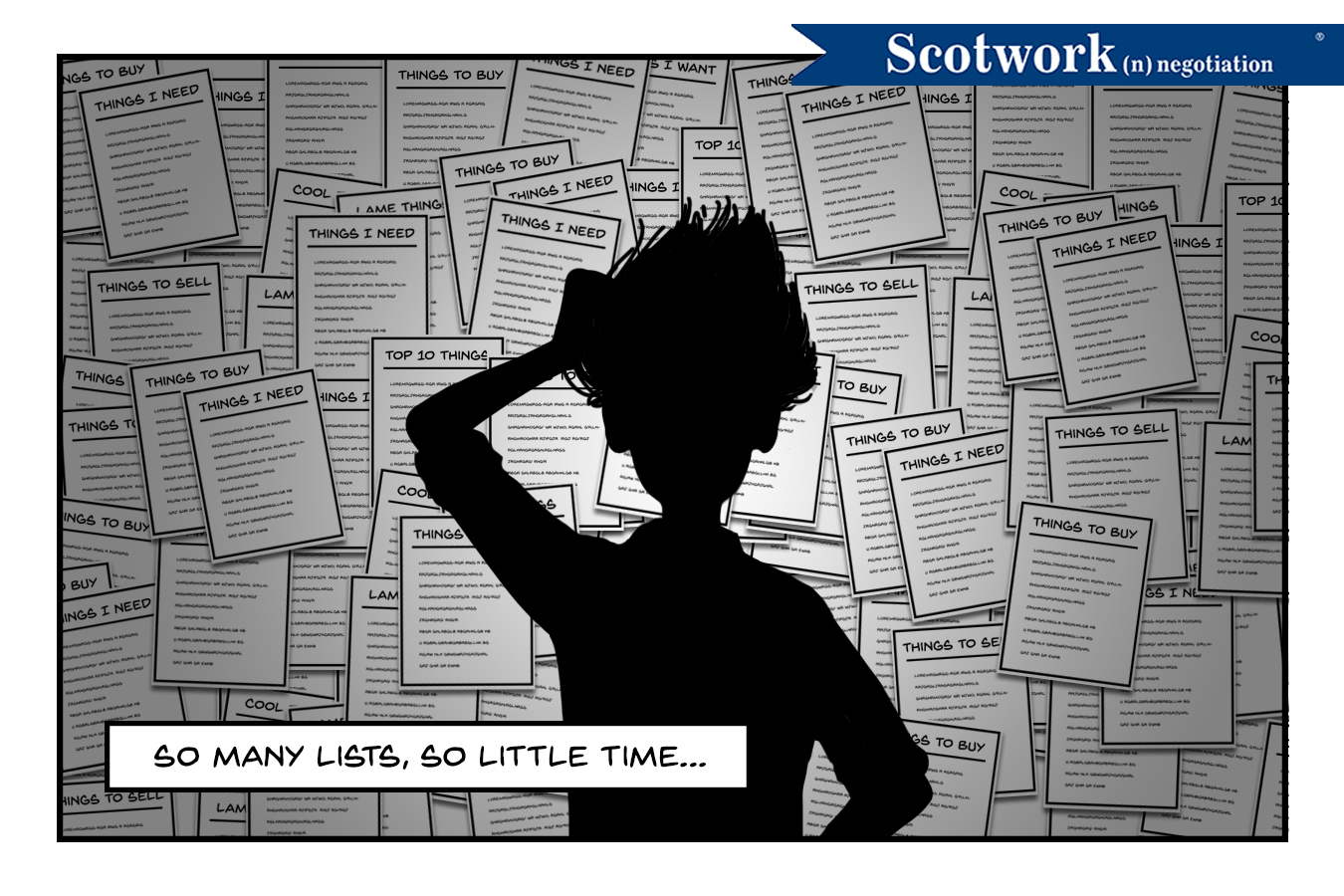Do you ever have that sense of panic when wondering if you thought of everything, or did you forget something? I feel this way every time I leave for the airport which is sad since I leave for the airport often. I also feel the same panic when I am finishing a negotiation, especially a complex one. And this was a complex negotiation that had a lot going on. There were a lot of details around the terms and conditions, payment terms, pricing, delivery dates, etc. Throughout the process I was maintaining a list of everything we needed to cover; as I always do. It’s when I got to the last item on the list, I realized I forgot one very important thing…
My life is about lists. I am almost compulsive; you can remove the almost from that statement. I carry paper in my purse, paper by my bed, and my desk by the end of the day can look like a commercial for 3M post-it notes. All of this for the purpose of making lists. I start my day with an action item list. That list generally has a combination of personal and professional to-do items and is more about my tasks for the day ahead. Alternatively, I have a whole other list for the things I keep procrastinating like, “call your mom”. Sorry mom.
For me, the simple act of creating the list helps me clear my mind and stay on point for my day. It also helps me stay focused when I’m working on a project or when I’m at the negotiating table. I am old fashioned when it comes to my lists. It’s your basic pen and paper. I have tried the digital lists but they don’t work for me. It’s something about the tactile experience of physically writing something on paper that provides me a level of comfort. For someone with such an extensive level of experience with lists, you would think I had seen it all, but alas that was not the case. I’ve recently discovered a new way to approach my lists that will not only help with that moment of panic but more importantly help me understand how to best optimize my list.
I recently read a book by Daniel Pink titled “When; The Scientific Secrets of Perfect Timing”. This book gave me a new way to think about how I should approach my lists. According to the book, I shouldn’t just be making a list and then taking the items one at a time. Instead, I should be giving more thought to when I do certain task list items during my day. Pink declares that everyone has three phases in which they experience their day; the peak, trough and recovery.
- Peak hours are when you should be doing more mathematical and complicated tasks (usually earlier in the day for most of us).
- Trough is when you are at your lowest productivity and should rest (maybe a coffee break or a walk outdoors).
- Recovery is a time for creative thinking and problem solving.
I started to think about this in terms of a negotiation. While we don’t always get to negotiate at our peak hours, I was thinking that items on my list might be better addressed at different times during a negotiation versus just going through my list sequentially. For instance:
- Peak Engagement: this is when everyone is highly engaged during the process; usually early in the negotiation. This would be an opportunistic time to discuss the more complicated issues because people have the most energy and engagement during this period and are usually more willing to work through something more complex.
- Trough Engagement: this is when engagement is the lowest; usually mid to later in a negotiation. At this point, it’s usually best to take a break or as we call it, an adjournment.
- Recover Engagement: this usually comes towards the end of a negotiation because this is when people are more interested in getting a deal and can get more creative in the way that deal comes together. Something we call bargaining.
Not all negotiations follow these patterns, but I think if you can recognize where engagement is the highest or lowest, you can prioritize your list of items in a more productive fashion.
So back to my story… the final important thing I forgot? To say, “thank you”. I know, it sounds a little basic but when things get a little crazed during a negotiation, even the best of us forget to say “thank you”. It’s now a permanent part of my list… so, thank you!
Add us to your list!
A negotiation can get overwhelming if you are not prepared and organized. We can help you get prepared and stay organized all throughout your negotiation. Let us be your advisor, your coach, or your trainer. Whether you bring us in to create your strategy, or help you prepare, or develop your team’s negotiating skills - we can help you win at the negotiating table.
We’ve been consulting and teaching our proven negotiation methodology for over 40 years. We know the process, we can identify the skills required, and we have the techniques to negotiate better deals for you. Call us and let’s discuss what we might be able to do for you.

